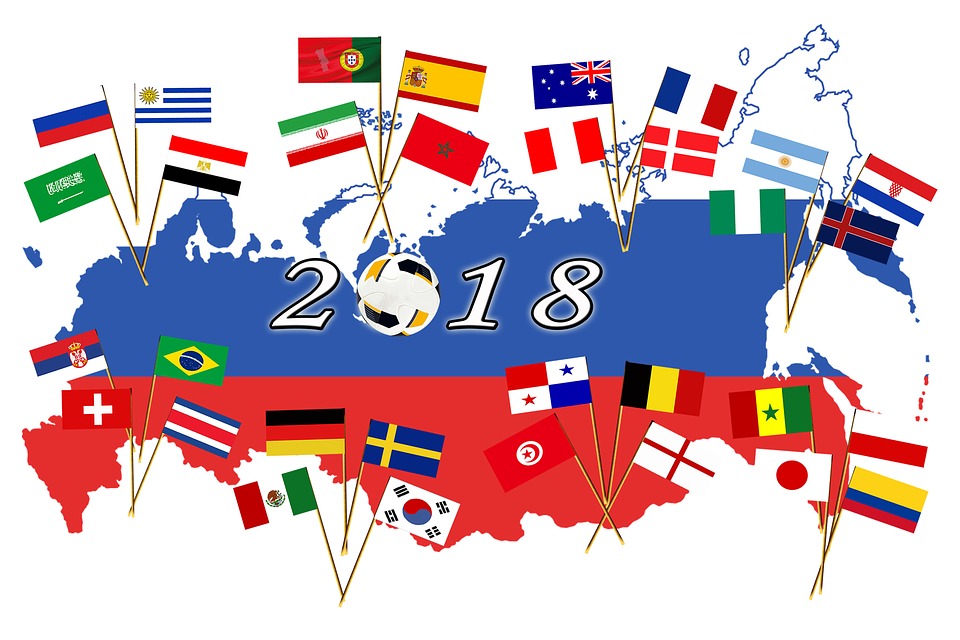 The 2018 FIFA World Cup kicked off in Russia on Thursday 14th June. This is the first World Cup held in Europe since 2006 and the first ever to be held in Eastern Europe. It’s time for football vocabulary to enter the EFL classroom again and as the World Cup also coincides with Wimbledon, it’s going to be a sporty month! Continue reading
The 2018 FIFA World Cup kicked off in Russia on Thursday 14th June. This is the first World Cup held in Europe since 2006 and the first ever to be held in Eastern Europe. It’s time for football vocabulary to enter the EFL classroom again and as the World Cup also coincides with Wimbledon, it’s going to be a sporty month! Continue reading
Category Archives: News
Baby Sussex is Here! Exploring Pregnancy and Baby Vocabulary
The Duchess of Sussex has given birth to a baby girl! Lilibet “Lili” Diana Mountbatten-Windsor was born on Friday 4th June in Santa Barbara, California. Lili is little sister to Archie. The Duke and Duchess named their newborn after the Royal Family’s nickname for the Queen, Lili’s great-grandmother. Her middle name is in honour of Diana Princess of Wales, her late grandmother.
Pregnancy and baby vocabulary is always useful to learn for dealing with situations related to families, doctors and women’s health. Join us to explore vocabulary and phrases related to pregnancy and babies as we welcome the new addition to the Duke and Duchess’s family. Continue reading
Get On the Starting Line… It’s the London Marathon!

1. London Marathon runners – image source
It’s the London Marathon this weekend! The big race is held annually in the spring and this year we’ll see over 40,000 people take to the streets of London for the 26.2 mile course. Whatever the weather, thousands will be lacing up their trainers with over 75% running to raise money for charity. Read on to learn more about this long-distance race and explore vocabulary and conversation topics in our fun London Marathon EFL lesson. Continue reading
Amazon’s Alexa to Offer Real-Time Translation

Amazon Alexa – Image source
Amazon is exploring the possibility of adding real-time translation to Alexa’s range of capabilities. If the real-time translation technology is enabled, this will help Alexa to tackle cultural misunderstandings, subtle nuances of speech and complex language barriers. Although the popular voice-enabled assistant can already translate simple words and phrases between a small number of languages, real-time translation from Alexa will enable universal communication on a much more sophisticated level. Continue reading
English in International Trade: Britain’s Secret Weapon Post Brexit?
![By GDJ — https://openclipart.org/user-detail/GDJ [<a href="http://creativecommons.org/publicdomain/zero/1.0/deed.en">CC0</a>], <a href="https://commons.wikimedia.org/wiki/File:GDJ-World-Flags-Globe.svg">via Wikimedia Commons</a> English in International Trade: Britain's Secret Weapon Post Brexit?](https://www.myenglishlanguage.com/wp-content/uploads/2017/12/globe-flags.png) With Brexit on the horizon, there are many discussions about the future of international trade. Former Italian prime minister Mario Monti has declared that English is ‘one of the very best products of Britain’ and that it should continue to be the main language of Europe for purposes of trade. He also said that Europe should ‘upgrade’ English after the UK’s departure from the EU to ‘increase its competitiveness’ on the world stage. The importance of English in international trade is obvious – so could this be Britain’s secret weapon post-Brexit? Continue reading
With Brexit on the horizon, there are many discussions about the future of international trade. Former Italian prime minister Mario Monti has declared that English is ‘one of the very best products of Britain’ and that it should continue to be the main language of Europe for purposes of trade. He also said that Europe should ‘upgrade’ English after the UK’s departure from the EU to ‘increase its competitiveness’ on the world stage. The importance of English in international trade is obvious – so could this be Britain’s secret weapon post-Brexit? Continue reading
Cambridge Assessment Launches New English Language Test: Linguaskill
 Cambridge Assessment English (previously known as Cambridge English Language Assessment) has launched a new simplified test called Linguaskill. This is a multilevel online test, which can provide personalised results within 12 hours. Linguaskill can test the writing, reading and listening skills of students from beginner A1 level up to advanced C1 level of the Common European Framework of Reference for Languages. Continue reading
Cambridge Assessment English (previously known as Cambridge English Language Assessment) has launched a new simplified test called Linguaskill. This is a multilevel online test, which can provide personalised results within 12 hours. Linguaskill can test the writing, reading and listening skills of students from beginner A1 level up to advanced C1 level of the Common European Framework of Reference for Languages. Continue reading
The Royal Wedding – Congratulations to Prince Harry and Meghan Markle!
The wedding of Prince Harry and Meghan Markle took place on Saturday 19th May at St George’s Chapel at Windsor Castle. The fifth in line to the British throne became engaged to the American former actress in November last year and the union of Harry and Meghan has brought Britain and America together – although they remain two nations divided by a common language! Join us for an exploration of wedding vocabulary and words related to engagements as we await the royal wedding. Continue reading
Are We Losing the Gradable Adverbs of British Understatement? Quite Possibly…
![Captain Lawrence Oates during the British Antarctic Expedition of 1911-1913, By Herbert Ponting [Public domain], via Wikimedia Commons](https://www.myenglishlanguage.com/wp-content/uploads/2017/11/Captain-Lawrence-Oates1.jpg) An English academic has claimed that many English adverbs are falling out of common usage. The classic understatement of English speakers means our language has always been peppered with phrases such as ‘rather difficult’, ‘quite likely’, ‘awfully expensive’ and ‘terribly sad’.
An English academic has claimed that many English adverbs are falling out of common usage. The classic understatement of English speakers means our language has always been peppered with phrases such as ‘rather difficult’, ‘quite likely’, ‘awfully expensive’ and ‘terribly sad’.
These trademark English expressions are under threat as we are doing away with gradable adverbs. Not only this, many traditional English words are being eroded by an influx of Americanisms. So does this mean the end for gradable adverbs and classic British understatement? Quite possibly… Continue reading
What’s in a Hurricane Name? Ph and F Sounds in English
 Hurricane Ophelia arrived in the British Isles on October 16th, leaving many homes in Ireland and Wales without power and schools temporarily closed. There were violently strong winds across parts of Scotland, Wales and England as the remnants of Hurricane Ophelia hit British shores from the Azores in the Atlantic Ocean.
Hurricane Ophelia arrived in the British Isles on October 16th, leaving many homes in Ireland and Wales without power and schools temporarily closed. There were violently strong winds across parts of Scotland, Wales and England as the remnants of Hurricane Ophelia hit British shores from the Azores in the Atlantic Ocean.
With so much discussion in the news about the hurricane, English language learners might have been intrigued or confused about the ‘ph’ pronunciation in the word Ophelia. Read on to find out the correct pronunciation of Hurricane Ophelia, how storms and hurricanes get their names and how the ‘ph’ sound and letter combination works in English. Continue reading
Learn Ancient and Rare Languages in New Online Courses
Have you ever wanted to talk to locals in the ancient language of Gangte? Now you can! Tribalingual is running a series of online language courses for students wishing to learn rare languages and help preserve ancient cultures. The last native speakers of a number of ancient and rare languages have been recruited to help deliver content for the courses, which will be taught via video link. Languages available to study include Ainu, a Japanese dialect, Greko, a ancient form of Greek, and Buryat, a Mongolian dialect. Would you like to study one of the world’s rarest languages? Continue reading

![1. Prince Harry and Meghan Markle, By Mark Jones [CC BY 2.0 (https://creativecommons.org/licenses/by/2.0)], via Wikimedia Commons (https://upload.wikimedia.org/wikipedia/commons/a/aa/Prince_Harry_and_Meghan_Markle.jpg) Duke and Duchess of Sussex - Meghan Markle and Prince Harry](http://www.myenglishlanguage.com/wp-content/uploads/2018/04/Prince-Harry-and-Meghan-Markle.jpg)
![1. Prince Harry and Meghan Markle on Christmas Day 2017 by Mark Jones [CC BY 2.0], via Wikimedia Commons Prince Harry and Meghan Markle - Wedding Vocabulary](http://www.myenglishlanguage.com/wp-content/uploads/2017/11/prince-harry-meghan-markle2.jpg)
![1. Native American in ink by wsilver via Flickr (https://www.flickr.com/photos/psycho-pics/6213458510) [CC BY 2.0] Native American in ink](http://www.myenglishlanguage.com/wp-content/uploads/2017/10/native-american.jpg)